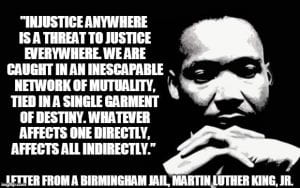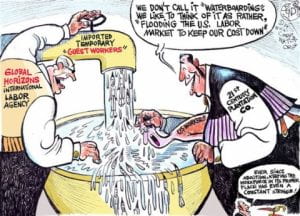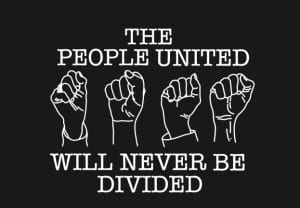One cannot ignore what is happening in the US right now. Peaceful Protests have turned to rightful riots against police brutality when militarised cops decide violence is an “okay” response to anything they deem threatening.  Racism is what built this country and it what it continues to stand on today, from the genocide of native people and the slave trade to mass incarceration and unfair representation in media. Food is a building block of life, and it has been a building block of the United States, as we will always be an agricultural and cultural powerhouse to the world, but how that food is produced and shared is how it becomes political.
Racism is what built this country and it what it continues to stand on today, from the genocide of native people and the slave trade to mass incarceration and unfair representation in media. Food is a building block of life, and it has been a building block of the United States, as we will always be an agricultural and cultural powerhouse to the world, but how that food is produced and shared is how it becomes political.
Thanksgiving is one of the only true American Holidays, and it is built on lies, deceit, and the mass burial grounds of Native Americans. The hallmark story told in schools is that the pilgrims and the native  peoples came together on this day and shared food, teaching each other how to grow different plants like maize, and became the first sharing of culture amongst the peoples. It was a day of a “peace treaty” following the massacre of the Pequot people in 1637, to which the native people were not even invited. The native people did teach the pilgrims how to farm American crops, but the teachers were sold into slavery or died of smallpox introduced by the Pilgrims themselves. It is impossible to partake in this holiday without recognising the false stories used to sweeten the history of the beginnings of American agriculture as we know it.
peoples came together on this day and shared food, teaching each other how to grow different plants like maize, and became the first sharing of culture amongst the peoples. It was a day of a “peace treaty” following the massacre of the Pequot people in 1637, to which the native people were not even invited. The native people did teach the pilgrims how to farm American crops, but the teachers were sold into slavery or died of smallpox introduced by the Pilgrims themselves. It is impossible to partake in this holiday without recognising the false stories used to sweeten the history of the beginnings of American agriculture as we know it.
Cotton and Tobacco are not food crops, but their agricultural value drove the slave trade in the United States to a massive extent.  Black and brown people, primarily from Africa, were treated as livestock to work on farms to make money for their owners. The generational trauma and erased generational wealth of the slave trade have built the culture of racism that is still prevalent today. The ability to own a human being is something that should be looked upon in shame but is still revered by statues of confederate generals, including ones in my own neighbourhood (sign the petition to remove it). Agriculture is what drove slavery to exist and be as prolific as it was in the United States, and without it, the culture of black oppression would certainly not be the same as it is today.
Black and brown people, primarily from Africa, were treated as livestock to work on farms to make money for their owners. The generational trauma and erased generational wealth of the slave trade have built the culture of racism that is still prevalent today. The ability to own a human being is something that should be looked upon in shame but is still revered by statues of confederate generals, including ones in my own neighbourhood (sign the petition to remove it). Agriculture is what drove slavery to exist and be as prolific as it was in the United States, and without it, the culture of black oppression would certainly not be the same as it is today.
These incidences seem an infinite distance from us, as the past is something we do not have the ability to change, but racist practices exist in food and food culture today. Bon Appetit, a highly respected and revered food magazine, has just fired its Editor in Chief after BIPOC staff accused (rightfully) Adam Rappoport of racist hiring practices, paying BIPOC staff significantly less than white counterparts, not featuring black and brown cuisine as much as Asian, European, and American, and of false allyship by putting BIPOC on camera as just a display of diversity. Black and Brown people’s food is not seen as complicated, mainstream, or high cuisine as its white counterparts that have dominated the food industry, such as French or Italian cooking, when they are often just as complex, and honestly better tasting. Food is inherently political, especially when influence over it is filled with racism.
Black and Brown people’s food is not seen as complicated, mainstream, or high cuisine as its white counterparts that have dominated the food industry, such as French or Italian cooking, when they are often just as complex, and honestly better tasting. Food is inherently political, especially when influence over it is filled with racism.
Food is important for our health and culture, but when these areas are filled with racism and racist practices, it becomes hard to separate them. Food should be something created with love, not hate or intent to harm. Changing this is how racism can start to become less prevalent in our daily lives, as food and the practice of cooking is something people do every day. Dismantling individual ideas about food and food culture and the racism that is inherently a part of it is important as it will help us move forward.
How are you challenging yourself and the racism in your food system today?



